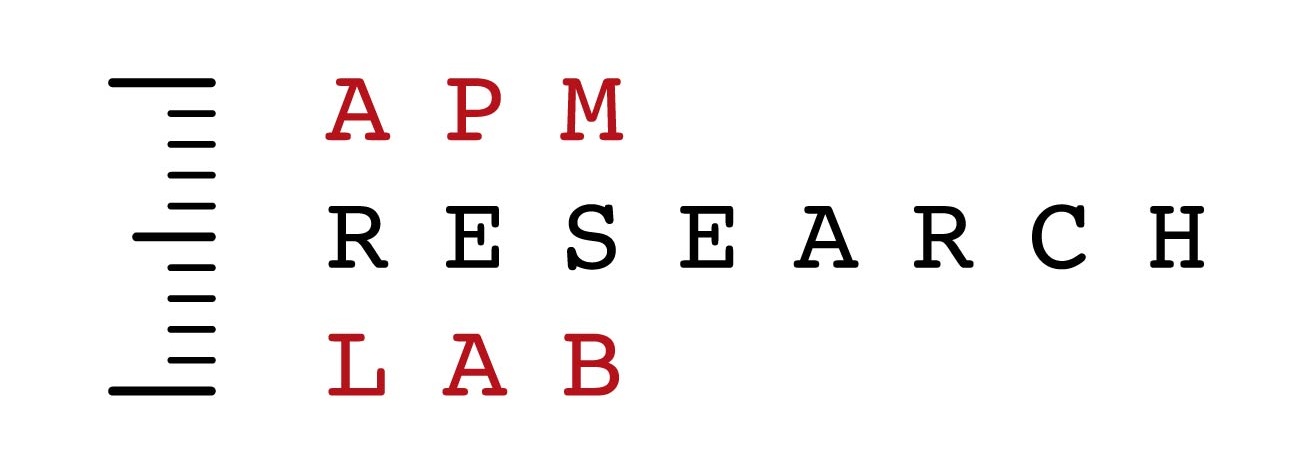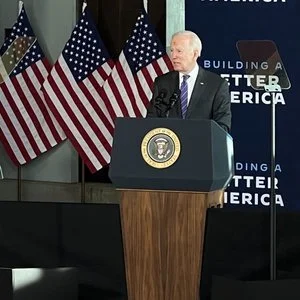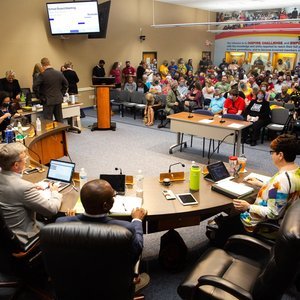Mood of the Nation Polls
Since 2021 the APM Research Lab has been partnering with Penn State’s McCourtney Institute for Democracy to report the results of their Mood of the Nation Poll to a broader audience.
The McCourtney Institute for Democracy promotes scholarship and practical innovations that defend and advance democracy in the United States and abroad. Through teaching, research and public outreach, the Institute leverages the resources of Penn State and partners around the world to foster a model of deliberation, policymaking and responsiveness that is passionate, informed and civil.
The Institute’s Mood of the Nation Poll offers a unique approach to public opinion polling. It allows Americans to speak in their own words through open-ended questions that focus on emotions like anger and hope, as well as commitment to constitutional principles.
Americans wary about the president taking unconventional actions
Americans show a strong preference for their elected executives — governors as well as the president — to achieve their political goals through conventional, sometimes slow, procedures. Results also show marked partisan differences. For example, 26% of all survey respondents rated a presidential action of firing all recently hired federal employees as “very appropriate,” including only four percent of Democrats and just over half of Republicans. (Poll conducted Mar. 12- April. 8, 2025; Published May 8, 2025.)
American institutions? 1 in 5 say "let them burn"
1 in 5 Americans agree with a statement indicating that the nation's political and social institutions should be allowed to burn. This includes larger minorities of younger generations and Hispanic Americans. The poll, conducted prior to the 2024 election, shows somewhat higher proportions of Trump voters favoring drastic changes. (Poll conducted Sept. 23-27, 2024; Published Dec. 31, 2024.)
A majority of Americans have participated in democracy this campaign season
A majority of Americans have engaged in at least one type of political activity over the course of this year’s campaign season. Of the seven activities listed in the survey, sharing political messages online was the most common. (Poll conducted Sept. 23-27, 2024.)
In the midst of a tight presidential race, Trump draws support from voters disillusioned with democracy
Forty-eight percent of the likely electorate plans to vote for Harris, while 45% plan to vote for Trump. Given the poll's ±4.2 percentage point margin of error, as well as the five percent of the electorate that remains undecided, the lead in the race is unclear. Harris leads among voters who express strong support for democracy as well as those with moderate support for democracy, while Trump has a clear lead among those disillusioned with democracy. (Poll conducted Sept. 23-27, 2024.)
What makes Americans proud and angry?
Nine in ten Americans can name either a recent news event or something about American politics that made them angry, while only half could identify a recent news event or something about American politics that made them proud, according to the McCourtney Institute for Democracy’s January 2024 Mood of the Nation Poll. (Poll conducted Jan. 11-17, 2024.)
A majority support federal involvement in dealing with water shortages and flooding
Nearly half of Americans think the federal government should play a major role in determining water allocations in parts of the country that are experiencing water scarcity. On flooding, Strong majorities support federal government involvement including federal flood insurance — either subsidized or unsubsidized — and federal relocation of flooded homeowners. (Poll conducted Jan. 11-17, 2024.)
Storms, heat, drought, floods and wildfires all common experiences in 2023
Two-thirds of American adults indicate that they experienced at least one of five major weather events in 2023. Even more Democrats than Republicans report experiencing severe weather events. (Poll conducted Jan. 11-17, 2024.)
A majority of Americans support universal background checks, gun licensing and an assault weapons ban
The latest Mood of the Nation Poll shows that bipartisan majorities of Americans support universal background checks and gun licensing. A majority supports an assault weapons ban even while nearly half support eliminating most current gun laws. (Poll conducted May 12-18, 2023.)
A majority of Americans embrace democracy, but most self-censor their political speech
Three-quarters of American adults endorse democracy as the best system of government, but only 16% say they feel comfortable talking about politics with everyone. Further, the poll finds that Americans are most inclined to self-censor at work and around family. About half indicate self-censoring their political speech around close friends. (Poll conducted May 12-18, 2023.)
Americans split on whether schools should teach about the on-going effects of slavery and racism
Nine in ten American adults think that schools have a responsibility to teach children about slavery, but only half think those lessons should extend to “the ongoing effects of slavery and racism in the United States.” The survey also asked respondents to indicate their preferences on who should shape curriculum related to slavery and racism, with results showing that American adults are most supportive of parents having influence, followed by social studies teachers. (Poll conducted May 12-18, 2023.)
Americans mixed on LGBTQ-related school policies
A majority of American adults think teachers with same-sex spouses should be allowed to display pictures of their spouses on their desks, and that classroom discussions of lesbian, gay and bisexual people are acceptable in middle school. But the survey also finds that Americans are split on whether teachers should use a teen’s preferred pronouns—and a majority oppose assigning books with lesbian, gay and bisexual characters to middle schoolers. (Poll conducted May 12-18, 2023.)
A plurality of Americans support religious work exemptions—but only if not costly
In Groff v. Dejoy the Supreme Court is poised to rule on whether the government, and possibly other employers, can make work on religiously significant days a non-negotiable part of someone’s job description. This poll finds that a slight plurality of Americans favors religious-based work exemptions for government employees, “but only if the cost and inconvenience are minimal.” (Poll conducted May 12-18, 2023.)
Americans’ legislative wish list for new congress shows frustration with political systems
If they could get the new Congress to enact a law with the wave of a magic wand, one in four Americans would enact political or electoral reform according to a new poll from Penn State’s McCourtney Institute for Democracy. (Poll conducted Nov. 14-18, 2022.)
A strong majority of Americans endorse democracy, but some—especially among younger generations—are skeptical
A strong majority of Americans agree that democracy is the best system of governance, but that there are pockets of skepticism—especially among younger Americans. One in five of adults in Generation Z and Millennials indicate “dictatorship could be good in certain circumstances.” (Poll conducted Nov. 14-18, 2022.)
Trust in the FBI higher among Democrats: Americans also significantly differ in their views of the FBI by generation
Half of Americans trust the FBI to do what is right either "most of the time" or "just about always," but one in five say that they "hardly ever" trust the FBI to do what is right. (Poll conducted Nov. 14-18, 2022.)
Amid Russia Ukraine war, Americans divided over Biden’s influence on military aid
A plurality of Americans believe the U.S. is providing the right amount of military support for Ukraine. Nearly three-quarters of Americans said the U.S. military should have a great deal or fair amount of influence over how Ukraine is supported. And 66% percent of Americans believed experts on Ukraine and Russia within the U.S. Department of State should have a great deal or a fair amount of influence over U.S. support for Ukraine. (Poll conducted May 11-19, 2022.)
Most Americans think liberty has waned, rights will further diminish
A majority of Americans believes they have lost more personal freedoms in the past 10 years than the they have gained, and will continue to lose more than gain in the next decade. (Poll conducted May 11-19, 2022.)
Reducing government spending among ways Americans think inflation should be fought
The latest Mood of the Nation poll shows that Americans are divided on who should inflation influence and how it should be addressed, with 1 in 5 not knowing what how the federal government should fight inflation. (Poll conducted May 11-19, 2022.)
On the brink of a potential overturn of Roe v. Wade, Americans are divided on abortion
The U.S. Supreme Court is likely to overturn its landmark Roe v. Wade decision according to a leaked draft opinion first obtained by Politico. At this historic moment, it’s worth taking a look at Americans’ opinions on abortion, and how those opinions follow demographic, socio-economic and political lines. (Poll conducted May 11-19, 2022.)
Policies, economy loom large in Americans’ assessment of President Biden
The McCourtney Institute for Democracy at Penn State’s most recent Mood of the Nation Poll, conducted May 11-19, 2022, finds that well over half the American public disapproves of the job that Joe Biden is doing as president, with 45% disapproving strongly. Perhaps more importantly, the survey provides a window into what Americans feel the president could do to improve his job performance. (Poll conducted May 11-19, 2022.)
How Americans think schools should teach about race, evolution and sex
Most Americans do not think state legislatures and governors should have a “great deal of influence” over how such issues are taught, and many respondents want to give such influence to parents and teachers. Americans are divided over whether contemporary race issues should be taught. (Poll conducted Nov. 30-Dec. 7, 2021.)
What Americans think schools should do when COVID-19 spikes
Over 70% of Americans favor, at a minimum, masking in K-12 public schools as a response to increasing cases of COVID-19 in their local community. Nearly 60%, however, also support the continuation of in-person instruction, “even if some students might get sick.” (Poll conducted Nov. 30-Dec. 7, 2021.)
Majority of Americans are “extremely worried” about the country in 2022
When considering levels of worry and hope, the overall mood of the nation has not been this pessimistic since the lead up to the 2016 presidential election. Over half the American public is “extremely worried” about where the country is headed over the next 12 months, citing politics, the economy—particularly inflation—and COVID-19 as the main sources of concern. (Poll conducted Nov. 30-Dec. 7, 2021.)
In their own words: What Americans think of President Joe Biden
Over half the American public disapproves of the job that Joe Biden is doing as president. Perhaps more importantly, the survey provides a window directly into the reasons behind the low approval ratings received by Mr. Biden less than a year into his presidency. (Poll conducted Nov. 30-Dec. 7, 2021.)
Most, but not all, Americans willing to help both Afghan refugees and Americans displaced by extreme weather
A strong majority of Americans support helping Afghans who have assisted the U.S.; even more support helping fellow Americans who have lost a home to extreme weather. (Poll conducted Oct. 20-27, 2021.)
How long is too long to wait in line to vote? And what types of assistance should be allowed?
A majority of Americans believe that no voter should have to wait longer than 60 minutes to cast their ballot. Nearly half indicate that wait times exceeding 30 minutes are unacceptable. In addition, the vast majority of Americans believe some forms of assistance to would-be voters facing long wait times should be allowed. (Poll conducted April 13-20, 2021.)
How do Americans feel about who should be allowed to vote? And why?
In an effort to gauge how Americans are feeling about various aspects of the country’s politics and society, Penn State’s McCourtney Institute for Democracy regularly conducts the nationally representative Mood of the Nation poll. The April 2021 poll results reveal how Americans feel about who should be allowed to vote and why. (Poll conducted April 13-20, 2021.)



























